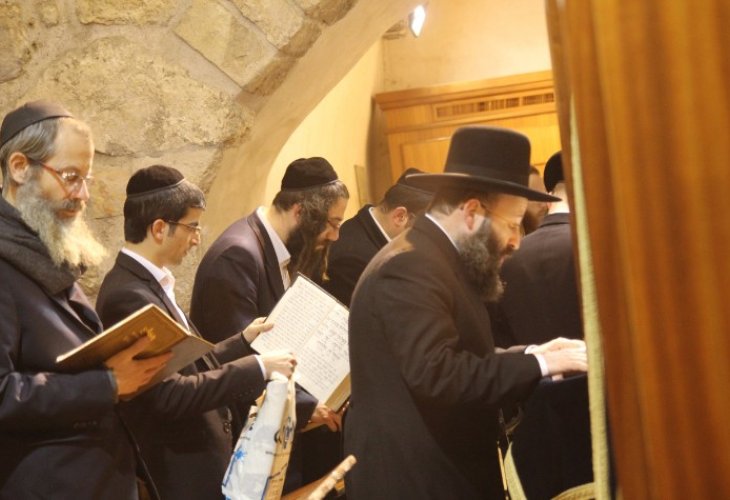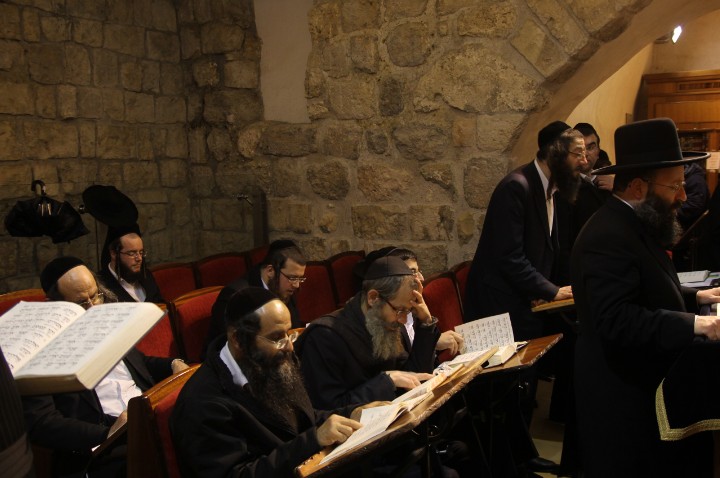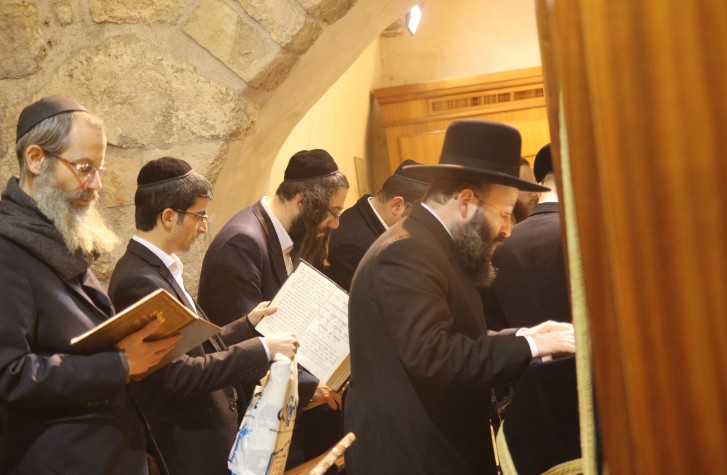The Pillars at the Western Wall: Jews Who Pray Daily Under All Conditions
Every day, rain or shine, during peaceful times and periods of tension, these devout Jews visit the Western Wall. Rabbi Shealtiel Cohen, R' Daniel Yom Tov, and Rabbi David Cohen-Zangi share their uplifting experiences. A special feature.

The new month of Tammuz approaches, along with concerns about the well-known provocations by Women of the Wall. These concerns are heightened by recent unrest surrounding the Reform Western Wall agreement, and the future remains uncertain.
In these times, when the world's most sacred site risks desecration, we chose to speak with the true people of the Wall - those who visit the Western Wall daily without fail; those who consider it a privilege to pray near the remnants of the Holy Temple and refuse to forgo it for anything; those for whom the Wall holds a deep place in their hearts, and who have many stories about it. We set out to hear their stories about the Wall they know, and that we share.
Rabbi Shealtiel Cohen: The Real Women of the Wall
Rabbi Shealtiel Cohen has been coming to the Western Wall daily for ten years. When asked what initiated this routine, he explains it happened quite naturally. "I lived in Zichron Moshe, and for years, I visited the Wall frequently. Over time, I felt the awakening and unity present there, and sensed the elevation from prayer and the special atmosphere. It made it hard for me to stay away, so I began coming regularly – every day. I always arrive at dawn, pray Shacharit, study a bit, and continue with my daily work. I don't miss Fridays, Shabbat, or the eve of holidays."
And isn't it difficult for you?
"Not at all, quite the opposite – I feel it's a privilege to reach the Wall. It helps me start my day in a more elevated way. It's not just the prayer that feels different, but the experience of seeing Jews from all over the country and the world, and how everyone feels this is the closest place to them. It gives me strength and encouragement."
Rabbi Cohen, head of a Kollel in Jerusalem and author of eight holy books, notes that people often stop him at the Wall because they recognize him and want his counsel on various issues. "I see it as a mission to talk with any Jew, because at such a holy place, hearts are open and receptive. Even those who don't want to hear about Judaism, I ask, 'What? Aren't you curious about what your forefathers studied 2,000 years ago? Let's set aside religion; think of it as a fascinating historical document.'"
He shares a moving story: "About seven years ago, I met a Jewish businessman from Los Angeles at the Wall. He was retired, had moved to the Jewish Quarter area, and was neither wearing a kippah nor any religious symbol. Despite this, I encouraged him to visit the Wall weekly and study with me after prayer. To my surprise, he agreed. We began learning Mishnahs, and after a few weeks, he wanted to learn twice a week. Seven years later, he almost comes daily, and we've completed several tractates. It's hard to describe the immense satisfaction this brings."
Rabbi Cohen no longer lives in Zichron Moshe; he moved to the more distant Mekor Baruch neighborhood. Of course, this hasn't stopped him from staying committed to his daily visits to the Wall, though now he takes a bus instead of walking. "Initially, I worried about the longer commute," he says, "But the bus ride exposed me to an amazing sight: the bus passes its stations at 4:45 a.m., and as early as 4:30, you see righteous women waiting. The driver knows the passengers, and it's happened that one was missing, so he waited at the station, hoping she would arrive.
"It's a stunning and moving scene," concludes Rabbi Cohen, "and when I see these women leave their homes and families to pray, I know they are the real Women of the Wall."
R' Daniel Yom Tov: Psalms Every Day
For R' Daniel Yom Tov, everything started last Tu B'Shevat, when he took charge of a minyan managed by the Western Wall Rabbi's office. The daily minyan recites the entire Book of Psalms for the salvation of the Jewish people, also mentioning personal names for blessings and salvation. "Our prayer is free of charge, and we accept names for any purpose without a fee," he emphasizes.
As R' Daniel recounts, they start reading Psalms at 2:30 p.m., gathering together - twelve men sitting within the Western Wall tunnels, aligned directly across from the Holy of Holies. "We say the 'Yehi Ratzon' before the Psalms and then start reading the book in one go, maintaining a complete speech fast. The atmosphere is uplifting; we genuinely feel holiness in the air."
They finish the Psalms around 5:00 p.m., then mention all the names sent to them via the Western Wall website and other sources. Finally, they recite the Thirteen Attributes of Mercy.
![From the Minyan of Psalms led by Rabbi Daniel Yom Tov at the Western Wall]() From the Minyan of Psalms led by Rabbi Daniel Yom Tov at the Western Wall
From the Minyan of Psalms led by Rabbi Daniel Yom Tov at the Western Wall
How do you manage to come every time, no matter the situation?
"It really isn't easy," he admits honestly. "As I mentioned, we started last winter, right during a snow forecast. Nonetheless, we decided to come without knowing how we'd get back home. It's not just the cold that's challenging; there are days like holiday evenings, Shabbat, and festivals when it's particularly tough to come. It's truly a form of self-sacrifice for the entire Jewish people, but those who come know they bear a responsibility. Not long ago, one minyan participant came immediately after his wife gave birth. He came straight from the delivery room, explaining he just couldn't skip it." Regardless, R' Daniel notes that they have 12 participants in the minyan, not ten, ensuring there's always a minyan even if someone is absent.
And what gives you the strength to persist?
"We draw much strength from Rabbi Shmuel Rabinowitz, the Rabbi of the Western Wall, who often prays with us and participates in the Psalms reading," R' Daniel responds. "Truthfully," he adds, "I personally find strength also from the prayer itself. The Torah says, 'Every man shall give for his soul,' teaching us that every giving is also a receiving. Although I pray for the people of Israel, I feel that I receive special heavenly assistance in all my personal matters."
Rabbi David Cohen-Zangi: Forty Years at the Wall
Rabbi David Cohen-Zangi has been visiting the Western Wall at dawn for forty years without missing a day. He prays Shacharit and then stays for about two more hours to finish the entire Book of Psalms.
Due to his regular presence, Rabbi Cohen-Zangi witnesses many salvations. "Just this week, a Jew from Brazil came to the Wall to publicize his miracle: he shared that years ago, he came to Israel specifically to pray at the Wall for his son, who was over forty and still hadn't found his match. He has now returned to thank – his son is married with a son and a daughter."
Rabbi Cohen-Zangi is not young anymore, yet when asked what he does on cold days, he briefly replies, "I wear a coat and take an umbrella. What's the problem?"
![]()
What about when it snows?
"When it snowed, I walked," he replies simply, not understanding our marvel.
He's seen a lot in his life, stating he's witnessed nearly all the rabbis visiting the Wall, along with numerous Knesset members and public figures coming to pray. "I won't name names, but there are very famous people who came early to avoid being seen. Maybe they're ashamed of their prayers, but apparently, they too believe in some way..." Throughout his forty years visiting the Wall, Rabbi Cohen-Zangi notes, "Never, ever have I seen the Wall empty."
Not even during periods of terrorism?
"Certainly not. People continued to come even during those times, though there were definitely fewer."
Speaking of terrorism, he tells a moving story: "A few months ago, I walked to the Wall through Damascus Gate. I didn't fear; I was with a group of Jews. Suddenly, I found the group had moved ahead, and I was alone on the street. Arab passersby began chanting in Arabic and gesturing. It was terrifying. I started running, and they chased after me. At the last moment, I reached soldiers, just after one Arab had kicked me."
Rabbi Cohen-Zangi recounts the story with tears of emotion: "The soldiers suggested I file a complaint, but I didn't. I was so moved because I felt all my prayers over the years had been effective, and from above, there was protection to ensure nothing bad happened to me."
In these times, when the world's most sacred site risks desecration, we chose to speak with the true people of the Wall - those who visit the Western Wall daily without fail; those who consider it a privilege to pray near the remnants of the Holy Temple and refuse to forgo it for anything; those for whom the Wall holds a deep place in their hearts, and who have many stories about it. We set out to hear their stories about the Wall they know, and that we share.
Rabbi Shealtiel Cohen: The Real Women of the Wall
Rabbi Shealtiel Cohen has been coming to the Western Wall daily for ten years. When asked what initiated this routine, he explains it happened quite naturally. "I lived in Zichron Moshe, and for years, I visited the Wall frequently. Over time, I felt the awakening and unity present there, and sensed the elevation from prayer and the special atmosphere. It made it hard for me to stay away, so I began coming regularly – every day. I always arrive at dawn, pray Shacharit, study a bit, and continue with my daily work. I don't miss Fridays, Shabbat, or the eve of holidays."
And isn't it difficult for you?
"Not at all, quite the opposite – I feel it's a privilege to reach the Wall. It helps me start my day in a more elevated way. It's not just the prayer that feels different, but the experience of seeing Jews from all over the country and the world, and how everyone feels this is the closest place to them. It gives me strength and encouragement."
Rabbi Cohen, head of a Kollel in Jerusalem and author of eight holy books, notes that people often stop him at the Wall because they recognize him and want his counsel on various issues. "I see it as a mission to talk with any Jew, because at such a holy place, hearts are open and receptive. Even those who don't want to hear about Judaism, I ask, 'What? Aren't you curious about what your forefathers studied 2,000 years ago? Let's set aside religion; think of it as a fascinating historical document.'"
He shares a moving story: "About seven years ago, I met a Jewish businessman from Los Angeles at the Wall. He was retired, had moved to the Jewish Quarter area, and was neither wearing a kippah nor any religious symbol. Despite this, I encouraged him to visit the Wall weekly and study with me after prayer. To my surprise, he agreed. We began learning Mishnahs, and after a few weeks, he wanted to learn twice a week. Seven years later, he almost comes daily, and we've completed several tractates. It's hard to describe the immense satisfaction this brings."
Rabbi Cohen no longer lives in Zichron Moshe; he moved to the more distant Mekor Baruch neighborhood. Of course, this hasn't stopped him from staying committed to his daily visits to the Wall, though now he takes a bus instead of walking. "Initially, I worried about the longer commute," he says, "But the bus ride exposed me to an amazing sight: the bus passes its stations at 4:45 a.m., and as early as 4:30, you see righteous women waiting. The driver knows the passengers, and it's happened that one was missing, so he waited at the station, hoping she would arrive.
"It's a stunning and moving scene," concludes Rabbi Cohen, "and when I see these women leave their homes and families to pray, I know they are the real Women of the Wall."
R' Daniel Yom Tov: Psalms Every Day
For R' Daniel Yom Tov, everything started last Tu B'Shevat, when he took charge of a minyan managed by the Western Wall Rabbi's office. The daily minyan recites the entire Book of Psalms for the salvation of the Jewish people, also mentioning personal names for blessings and salvation. "Our prayer is free of charge, and we accept names for any purpose without a fee," he emphasizes.
As R' Daniel recounts, they start reading Psalms at 2:30 p.m., gathering together - twelve men sitting within the Western Wall tunnels, aligned directly across from the Holy of Holies. "We say the 'Yehi Ratzon' before the Psalms and then start reading the book in one go, maintaining a complete speech fast. The atmosphere is uplifting; we genuinely feel holiness in the air."
They finish the Psalms around 5:00 p.m., then mention all the names sent to them via the Western Wall website and other sources. Finally, they recite the Thirteen Attributes of Mercy.
 From the Minyan of Psalms led by Rabbi Daniel Yom Tov at the Western Wall
From the Minyan of Psalms led by Rabbi Daniel Yom Tov at the Western WallHow do you manage to come every time, no matter the situation?
"It really isn't easy," he admits honestly. "As I mentioned, we started last winter, right during a snow forecast. Nonetheless, we decided to come without knowing how we'd get back home. It's not just the cold that's challenging; there are days like holiday evenings, Shabbat, and festivals when it's particularly tough to come. It's truly a form of self-sacrifice for the entire Jewish people, but those who come know they bear a responsibility. Not long ago, one minyan participant came immediately after his wife gave birth. He came straight from the delivery room, explaining he just couldn't skip it." Regardless, R' Daniel notes that they have 12 participants in the minyan, not ten, ensuring there's always a minyan even if someone is absent.
And what gives you the strength to persist?
"We draw much strength from Rabbi Shmuel Rabinowitz, the Rabbi of the Western Wall, who often prays with us and participates in the Psalms reading," R' Daniel responds. "Truthfully," he adds, "I personally find strength also from the prayer itself. The Torah says, 'Every man shall give for his soul,' teaching us that every giving is also a receiving. Although I pray for the people of Israel, I feel that I receive special heavenly assistance in all my personal matters."
Rabbi David Cohen-Zangi: Forty Years at the Wall
Rabbi David Cohen-Zangi has been visiting the Western Wall at dawn for forty years without missing a day. He prays Shacharit and then stays for about two more hours to finish the entire Book of Psalms.
Due to his regular presence, Rabbi Cohen-Zangi witnesses many salvations. "Just this week, a Jew from Brazil came to the Wall to publicize his miracle: he shared that years ago, he came to Israel specifically to pray at the Wall for his son, who was over forty and still hadn't found his match. He has now returned to thank – his son is married with a son and a daughter."
Rabbi Cohen-Zangi is not young anymore, yet when asked what he does on cold days, he briefly replies, "I wear a coat and take an umbrella. What's the problem?"

What about when it snows?
"When it snowed, I walked," he replies simply, not understanding our marvel.
He's seen a lot in his life, stating he's witnessed nearly all the rabbis visiting the Wall, along with numerous Knesset members and public figures coming to pray. "I won't name names, but there are very famous people who came early to avoid being seen. Maybe they're ashamed of their prayers, but apparently, they too believe in some way..." Throughout his forty years visiting the Wall, Rabbi Cohen-Zangi notes, "Never, ever have I seen the Wall empty."
Not even during periods of terrorism?
"Certainly not. People continued to come even during those times, though there were definitely fewer."
Speaking of terrorism, he tells a moving story: "A few months ago, I walked to the Wall through Damascus Gate. I didn't fear; I was with a group of Jews. Suddenly, I found the group had moved ahead, and I was alone on the street. Arab passersby began chanting in Arabic and gesturing. It was terrifying. I started running, and they chased after me. At the last moment, I reached soldiers, just after one Arab had kicked me."
Rabbi Cohen-Zangi recounts the story with tears of emotion: "The soldiers suggested I file a complaint, but I didn't. I was so moved because I felt all my prayers over the years had been effective, and from above, there was protection to ensure nothing bad happened to me."

